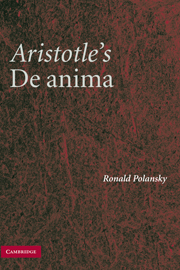Book contents
- Frontmatter
- Contents
- Preface
- List of Abbreviations
- Introduction
- COMMENTARY ON DE ANIMA: : Book 1
- COMMENTARY ON DE ANIMA: Book 2
- 1 Definition of Soul
- 2 What Is Life?
- 3 How Powers of Soul Are Distributed and United in the Soul
- 4 The Nutritive Faculty: Its Object and Subfaculties
- 5 Clarification of Being Affected, Living as Saving, and the First Definition of Sense
- 6 The Three Sorts of Sensible Objects
- 7 Vision, Medium, and Object
- 8 Hearing, Sound, and Voice
- 9 Smell and Odor
- 10 Taste Is a Contact Sense; the Tasteable
- 11 Touch, the Tangibles, and Sense as a Mean
- 12 Definition of Sense and Whether Sensibles Affect Nonperceiving Bodies
- COMMENTARY ON DE ANIMA: Book 3
- Bibliography
- Index
5 - Clarification of Being Affected, Living as Saving, and the First Definition of Sense
Published online by Cambridge University Press: 18 December 2009
- Frontmatter
- Contents
- Preface
- List of Abbreviations
- Introduction
- COMMENTARY ON DE ANIMA: : Book 1
- COMMENTARY ON DE ANIMA: Book 2
- 1 Definition of Soul
- 2 What Is Life?
- 3 How Powers of Soul Are Distributed and United in the Soul
- 4 The Nutritive Faculty: Its Object and Subfaculties
- 5 Clarification of Being Affected, Living as Saving, and the First Definition of Sense
- 6 The Three Sorts of Sensible Objects
- 7 Vision, Medium, and Object
- 8 Hearing, Sound, and Voice
- 9 Smell and Odor
- 10 Taste Is a Contact Sense; the Tasteable
- 11 Touch, the Tangibles, and Sense as a Mean
- 12 Definition of Sense and Whether Sensibles Affect Nonperceiving Bodies
- COMMENTARY ON DE ANIMA: Book 3
- Bibliography
- Index
Summary
The treatment of nutritive life ultimately disclosed the way all the subfaculties work at saving life. This will also turn out fundamental for the treatments of sense and thought. When these cognitive faculties actually cognize their objects, their doing so will not be any sort of change or destruction of the faculty but its saving as the kind of being that it is. Perceiving and thinking are kinds of life, and life is activity complete and continuable. But Aristotle must now earnestly confront the difficulty of fitting treatment of cognition within the framework of physics, aframework that speaks of movers and things moved that is rather inapt for soul that might be better served by talk of activity complete at every moment. He therefore clarifies actuality and potentiality so far as needed to speak of sense perception, and such that he avoids a large break from physics.
Making the treatment of this chapter hard is the difficult relation of soul and cognition to physics. Aristotle has compelling reasons for offering claims that he also has to call into question. Book 1 has challenged any view that has the soul inmotion. So sense perception and thinking dubiously are kinds of motion, and he will himself in ii 5 elicit reasons for denying that they are motions at all. Yet if he needs to have them as ways of being acted upon by their cognitional objects, then in line with his natural science they should be motions caused by a mover. This serves to explain their origination and basis in reality.
- Type
- Chapter
- Information
- Aristotle's De AnimaA Critical Commentary, pp. 223 - 249Publisher: Cambridge University PressPrint publication year: 2007



